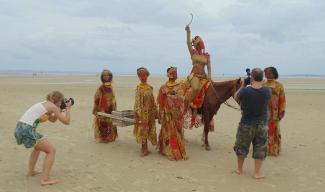
Instituto Sacatar
The Instituto Sacatar is an arts residency program on the island of Itaparica, across the bay from Salvador, Bahia, Brazil. Sacatar awards individuals (and, upon occasion, small groups) the time and space to pursue their creative work. The staff provides logistical support to meet the artist’s goals during the residency. Artists are selected through a competitive Open Call, announced through their website and social media. Artists of all ages, disciplines and nationalities may apply. In addition, the Instituto Sacatar works in partnership with a number of Brazilian and international organizations, which target specific nationalities, age groups and/or disciplines.
The first week of the residency is an orientation to the cultural geography of Bahia, Brazil, with optional tours of the island of Itaparica and the city of Salvador. Early in the residency, artists have an opportunity to solicit support for their aspirations and intentions during the upcoming residency through a public presentation to the local arts communities. The artists generally agree to host Open Studios the last week of their residency to share their work and experiences with collaborators, friends, school groups and the wider local community. The organizers will support artists who wish to offer workshops or other forms of public engagement as part of the residency. Artists are free to pursue whatever they wish during their residencies, but those artists who engage in the local culture in a manner consistent with their artistic practice have the most profound and meaningful experiences.
There are 5 studios and a woodworking shop clustered around the coconut grove facing the ocean. Two of these studios are open-air, designed primarily for visual artists, with ample wall space, work sinks and private internal gardens. A third studio, reserved primarily for writers, is raised on stilts, offering panoramic ocean views. There is a dance studio with a sprung-floor with doors that can be fully opened, thus turning the studio into an open air theater. There is a music studio, sometimes used also as a painting studio, in a far corner of the property where the musician is least likely to disturb the other residents. In addition, there are two studios in the main residential house. One measures 6.00 x 8.00 meters, and the other 3.50 x 5.00 meters. The ceilings in each are 3.60 meters high. Only the smaller studio has a sink. All the studios are simple rooms that can easily be adapted for other disciplines.
Sacatar Fellows are provided a private room with attached bath, a separate studio and all meals (except Saturday evenings, Sundays and Brazilian holidays) at the Instituto’s beach-side estate. They also provide weekly laundry service.
- Library: They have a broad collection of books, CDs and DVDs, with extensive material about Bahia, Brazil and the local culture, in English, Portuguese, and other languages. They ask that artists bring a book, CD or DVD of general interest – their own work or the work of others – to expand the collection.
- Woodworkshops: Artists are free to use the woodworking shop, which is also used by the maintenance staff. The woodshop has a circular saw, a planer and common hand tools. Former fellows have left supplies in an adjacent room for artists’ materials, where current fellows are free to forage.
- Internet: There is WiFi internet access for residents’ personal laptop computers. Artists should bring their own laptops, as needed. There are also several internet cafés within walking distance in the town of Itaparica. Internet service on the island of Itaparica is not always reliable and fellows may at times find themselves at a temporary loss for internet service. Please plan your work and communications accordingly.
- For photographers: There is a small refrigerator exclusively to store photographic film and film stock. We have no dark room, so non-digital photographers are limited in the work they can finalize at Sacatar.
- For ceramicists: They have no kiln, but there are possibilities to work at the local brickyard where there are four large wood-fired kilns or in the village of Maragogipinho two hours away, where there are over seventy wood-fired ceramic workshops.
The residency is located in a technically limited location and encourage artists to work simply and directly with few complex tools, materials, or technologies.
Once the spiritual retreat of a Catholic girls' school, and later an exclusive hotel, the Quinta Pitanga is a sea-side estate with a large courtyard house surrounded by coconut palms and countless pitanga berry bushes. The beach is secluded, with calm waters. It is a short walk to the historic village of Itaparica and an hour boat ride to Salvador. Arrival by plane to Salvador, the Foundation will greet artists at the airport and take them the first time to the island.






